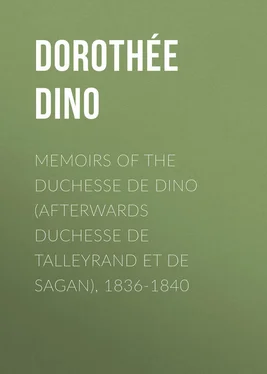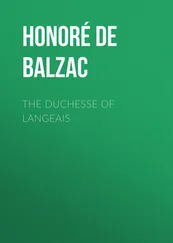Dino Dorothée - Memoirs of the Duchesse de Dino (Afterwards Duchesse de Talleyrand et de Sagan), 1836-1840
Здесь есть возможность читать онлайн «Dino Dorothée - Memoirs of the Duchesse de Dino (Afterwards Duchesse de Talleyrand et de Sagan), 1836-1840» — ознакомительный отрывок электронной книги совершенно бесплатно, а после прочтения отрывка купить полную версию. В некоторых случаях можно слушать аудио, скачать через торрент в формате fb2 и присутствует краткое содержание. Жанр: foreign_antique, foreign_prose, на английском языке. Описание произведения, (предисловие) а так же отзывы посетителей доступны на портале библиотеки ЛибКат.
- Название:Memoirs of the Duchesse de Dino (Afterwards Duchesse de Talleyrand et de Sagan), 1836-1840
- Автор:
- Жанр:
- Год:неизвестен
- ISBN:нет данных
- Рейтинг книги:4 / 5. Голосов: 1
-
Избранное:Добавить в избранное
- Отзывы:
-
Ваша оценка:
- 80
- 1
- 2
- 3
- 4
- 5
Memoirs of the Duchesse de Dino (Afterwards Duchesse de Talleyrand et de Sagan), 1836-1840: краткое содержание, описание и аннотация
Предлагаем к чтению аннотацию, описание, краткое содержание или предисловие (зависит от того, что написал сам автор книги «Memoirs of the Duchesse de Dino (Afterwards Duchesse de Talleyrand et de Sagan), 1836-1840»). Если вы не нашли необходимую информацию о книге — напишите в комментариях, мы постараемся отыскать её.
Memoirs of the Duchesse de Dino (Afterwards Duchesse de Talleyrand et de Sagan), 1836-1840 — читать онлайн ознакомительный отрывок
Ниже представлен текст книги, разбитый по страницам. Система сохранения места последней прочитанной страницы, позволяет с удобством читать онлайн бесплатно книгу «Memoirs of the Duchesse de Dino (Afterwards Duchesse de Talleyrand et de Sagan), 1836-1840», без необходимости каждый раз заново искать на чём Вы остановились. Поставьте закладку, и сможете в любой момент перейти на страницу, на которой закончили чтение.
Интервал:
Закладка:
I have a letter from Princess Louise of Prussia, my godmother, which speaks in very high terms of the young French Princes. Princess Louise is a clever woman, naturally inclined to sarcasm and severity, and her appreciation is therefore the more valuable. M. de Valençay writes to me that he has been greatly struck by the beauty of the Princesses, by their jewels and the elegance of their dress. Herr von Humboldt took the Princes and their suite to see the museums and the artists' studios. The Crown Prince of Prussia has a taste for art, and has greatly stimulated these matters in Berlin. The Duc d'Orléans has given great pleasure by ordering a statue from Rauch, the chief sculptor in Prussia, and the King's favourite. The shyness of the Queen of the Low Countries is even greater than that of the Duc de Nemours. This mutual defect seems to have brought them together, for I am told that the Queen has conceived a friendship for the young Prince and that long conversations have taken place between them.
Valençay, May 29, 1836. – Yesterday I read the new play of M. Casimir Delavigne, Une Famille au Temps de Luther . The work contains some fine lines, but is quite unsuited for the stage, and nothing is colder than its theological discussions, even when they conclude with crime; moreover, these forms of fanaticism are somewhat wearisome, discordant as they are with the spirit of our time. Finally, the dreadful massacre of St. Bartholomew has become even tiresome, and the best proof of the fact that both it and the atrocities of the Atrides have lost their power to thrill, is their recitation with songs and dances.
Madame Adélaïde informs M. de Talleyrand that the Crown Princess of Prussia has written to her mother, the Queen-Dowager of Bavaria, saying that she was forced to agree to the proposal to show honour to the French Princes, and that a very good friend of Louis-Philippe had advised them to show themselves in public.
The King of Naples has now left home, some say to marry a princess of Modena, and others to pay court to the daughter of the Archduke Charles, and others, again, to have a look at the young princesses of Paris.
The King is having a full-length portrait of François I. painted for Valençay, and another of the Grande Mademoiselle; the former built the Castle, and the latter visited it and praised it in her memoirs. The King is also sending M. de Talleyrand the chair in which Louis XVIII. was wheeled about, and he has informed us through Madame that if he should go to Bordeaux, as is possible, he would pass this way.
Valençay, May 31, 1836. – It seems that neither intellect nor years can shelter people from foolishness, and a great act of folly has been committed by M. Ancillon in his marriage with Mlle. de Verquignieulle, if what we hear from Berlin is true. M. de Valençay also informs me that the entertainment given by M. Bresson, 20 20 M. Bresson was the French Minister at Berlin.
at which the King of Prussia was present, was a very brilliant affair; all the servants were in full livery, blue, gold, and red, and Bresson said to him: "These are my colours," an amusing remark, and one worthy of the present time. "We shall see," as M. de Talleyrand says.
Valençay, June 1, 1836. – The young French gentlemen who went to Prague have returned after a very short stay. They were especially struck by the atmosphere of boredom which is the environment of life in that town. They said the Duc de Bordeaux had a very pleasant face, but his figure was not attractive and his mind but little developed, like that of a child brought up in the midst of old men.
At a dinner given on May 22 to the two French Princes by the Crown Prince of Prussia, Princess Albert, 21 21 Princess Albert of Prussia was a princess of the Low Countries.
to the great rage of Bresson, the great disgust of the King, and the general horror of the company, appeared with an enormous garland of lilies in her hair; up to that point her behaviour had been quite proper.
The presents distributed by the Duc d'Orléans at Berlin were most expensive, and in money and diamonds amounted to more than a hundred thousand francs. It is rather too much than not enough. Prince Wittgenstein received a box containing not only the portrait of the Prince Royal, but also that of the King and Queen – a very marked attention. M. Ancillon, plastered with the great Cross of the Legion of Honour, swelled himself out and strutted about, and appeared ready to trample upon any one and every one. His behaviour is explained by his middle-class origin and his Calvinistic views.
The parting was affectionate, some professing to love the Princes as their sons and others as their brothers; in short, no success was ever more complete. The ladies were all struck with the handsome appearance of the Duc d'Orléans. My authorities for these statements are reliable, as I quote not merely M. de Valençay, but other letters which came in yesterday, written moreover by natives of Berlin. The accident which nearly befell the Duc d'Orléans at the manœuvres was caused by his politeness to the Princesses; he was reining in his horse near them, when he was nearly thrown, but the skill with which he recovered himself gained him many compliments; and on this question the Duchess of Cumberland writes as follows: "Imagine what would have become of us if any misfortune had happened to him; I should be ready to leave my sick body upon my bed and be changed into a guardian angel to hover over them during their stay at Berlin, and thus to answer the confidence of your Queen, who begged me in a charming letter to treat her sons as my own."
Upon the day when our Princes were at home to the Diplomatic Body M. de Ribeaupierre, the Russian Minister, sent his excuses, alleging a swollen face. Contrary to the old etiquette of Berlin, the whole of the Diplomatic Body was invited to a ball at the house of Prince William, the King's brother. Of this entertainment I am informed: "The ball given to the French mission by order of the King, Louis-Philippe, was a great success; the French Princes were so tactful as to do the honours themselves, and received the King and the Princesses at the foot of the staircase."
Valençay, June 2, 1836. – The Princess de Lieven arrived here yesterday in a feeble state of health. We took her in and looked after her as well as we could, but towards the evening I began to feel that she had some presentiments of a tiresome stay, and that if the journey hither lay before her at this moment she would hesitate to undertake it. This I can understand. Here she will have no news and will not be able to see the shadow-show of life, which are both necessities to her. The novelty of the outer world, recollections and historical traditions, natural beauties, the domestic life of a household, reading, thought, and work are by no means to her taste, and in other respects Valençay has never been more poverty-stricken than at this moment.
The verses which M. de Peyronnet has sent to me are not very excellent, but that point is of no account in comparison with the actual circumstance and the whole question. During the winter I worked pretty hard for these poor people, and obtained some definite alleviation for M. Peyronnet, who was the worst of all in health, and this he found very agreeable; I hope that I may be able to do more for him as soon as the session is over. It was this charitable work which inspired the verses in question. 22 22 We have been unable to find them.
My sister writes to me from Vienna saying that great preparations are made to receive the French Princes, and in particular Paul Esterhazy is working for that purpose; there will be an entertainment at his house at Eisenstadt. Unfortunately many people are in the country and many in mourning.
Читать дальшеИнтервал:
Закладка:
Похожие книги на «Memoirs of the Duchesse de Dino (Afterwards Duchesse de Talleyrand et de Sagan), 1836-1840»
Представляем Вашему вниманию похожие книги на «Memoirs of the Duchesse de Dino (Afterwards Duchesse de Talleyrand et de Sagan), 1836-1840» списком для выбора. Мы отобрали схожую по названию и смыслу литературу в надежде предоставить читателям больше вариантов отыскать новые, интересные, ещё непрочитанные произведения.
Обсуждение, отзывы о книге «Memoirs of the Duchesse de Dino (Afterwards Duchesse de Talleyrand et de Sagan), 1836-1840» и просто собственные мнения читателей. Оставьте ваши комментарии, напишите, что Вы думаете о произведении, его смысле или главных героях. Укажите что конкретно понравилось, а что нет, и почему Вы так считаете.












